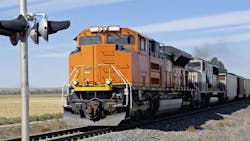BNSF Railway Takes Steps to Ensure Workers Can Report Injuries Without Fear of Retaliation
BNSF Railway Co. has signed an accord with OSHA to voluntarily revise the personnel policies OSHA claimed violated whistleblower provisions and discouraged workers from reporting on-the-job injuries.
Section 20109 of the Federal Railroad Safety Act’s (FRSA) protects railroad workers from retaliation for, among other acts, reporting suspected violations of federal laws and regulations related to railroad safety and security, hazardous safety or security conditions and on-the-job injuries.
The terms of BNSF’s accord with OSHA include:
- Changing BNSF’s disciplinary policy so that injuries no longer play a role in determining the length of an employee’s probation following a record suspension for a serious rule violation. As of Aug. 31, 2012, BNSF has reduced the probations of 136 employees who were serving longer probations because they had been injured on-the-job.
- Eliminating a policy that assigned points to employees who sustained on-the-job injuries.
- Revising a program that required increased safety counseling and prescribed operations testing so that work-related injuries will no longer be the basis for enrolling employees in the program. As part of the negotiations leading up to the accord, BNSF removed from the program approximately 400 workers.
- Instituting a higher-level review by BNSF’s upper management and legal department for cases in which an employee who reports an on-duty personal injury is also assessed discipline related to the incident giving rise to the injury.
- Implementing a training program for BNSF’s managers and labor relations and human resources professionals to educate them about their responsibilities under the FRSA. The training will be incorporated into BNSF’s annual supervisor certification program.
- Making settlement offers in 36 cases to employees who filed whistleblower complaints with OSHA alleging they were harmed by one or more of the company’s previous policies.
“Protecting America’s railroad workers who report on-the-job injuries from retaliation is an essential element in OSHA’s mission. This accord makes significant progress toward ensuring that BNSF employees who report injuries do not suffer any adverse consequences for doing so,” said OSHA Administrator Dr. David Michaels. “It also sets the tone for other railroad employers throughout the U.S. to take steps to ensure that their workers are not harassed, intimidated or terminated, in whole or part, for reporting workplace injuries.”
Between August 2007, when OSHA was assigned responsibility for whistleblower complaints under FRSA, and September 2012, OSHA received 1,206 FRSA whistleblower complaints. The number of FRSA whistleblower complaints that OSHA currently receives surpasses the number of whistleblower complaints that OSHA receives under any of the other 21 whistleblower protection statutes it enforces except for Section 11(c) of the Occupational Safety and Health Act of 1970. More than 60 percent of the FRSA complaints filed with OSHA involve an allegation that a railroad worker has been retaliated against for reporting an on-the-job injury.
Employees who believe that they have been retaliated against for engaging in a protected activity may file a complaint with the secretary of labor for an investigation by OSHA’s Whistleblower Protection Program. Detailed information on employee whistleblower rights is available online at http://www.whistleblowers.gov.
About the Author

Laura Walter
Laura Walter was formerly senior editor of EHS Today. She is a subject matter expert in EHS compliance and government issues and has covered a variety of topics relating to occupational safety and health. Her writing has earned awards from the American Society of Business Publication Editors (ASBPE), the Trade Association Business Publications International (TABPI) and APEX Awards for Publication Excellence. Her debut novel, Body of Stars (Dutton) was published in 2021.
